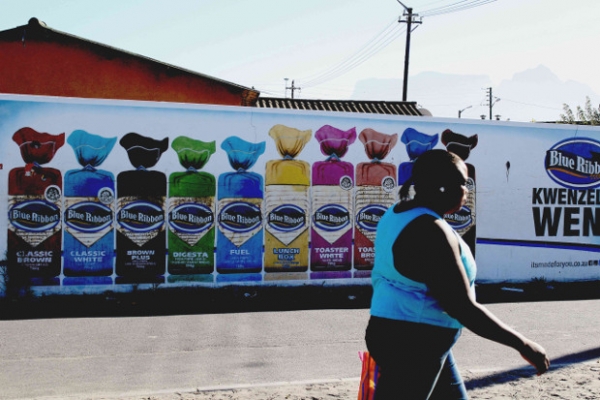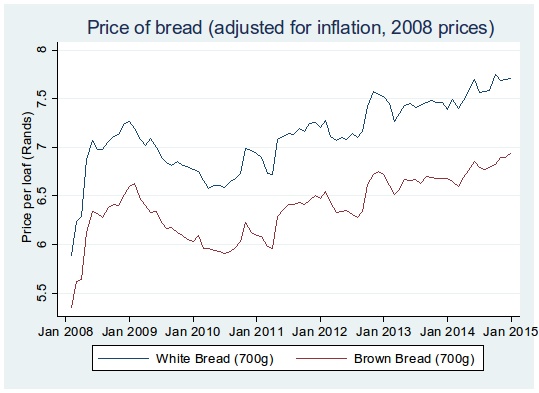What’s up with the price of bread?

Nomsa Vumazonke buys two loaves of bread every day. She lives in Philippi with her three children and four grandchildren, and after making sandwiches for them says there is nothing left for her to eat. “Bread is too expensive. It’s very hard. I have to buy bread for my children,” she says.
Over the course of 2014 the price of bread, a staple food for more than half of South Africa’s population, has risen nearly twice as fast as the inflation rate.
According to Stats SA, which monitors prices at more than 100 different locations across the country to calculate the average bread price, the price of a standard (700g) loaf of white bread rose 8.9% from R10.49 to R11.43 from January to December last year.
The price of an equivalent brown loaf rose 8.1% from R9.47 to R10.24.
Over the same period, the consumer price index (the measure of the general rate of inflation) has risen 4.4%.
At the beginning of 2015 the average price was R11.42 for a standard (700 gram) loaf of white bread, and R10.29 for an equivalent brown loaf.
Bread from spaza shops or informal retailers usually costs more than the same product from large retail chains which negotiate with suppliers or bake their own bread.
The recent price rise is not a new phenomenon. The graph below shows the price of white and brown bread since 2008, adjusted for inflation. It shows that for the past four years the price has risen much faster than the inflation rate.

Brown bread is cheaper than white bread for two reasons. Firstly, it has a higher extraction rate, meaning that more brown loaves can be made from the same amount of wheat, relative to white loaves. Secondly, unlike white bread, no Value Added Tax (VAT) is applied to brown bread.
This means that a loaf of brown bread should cost at least 14% less than a white loaf, since VAT is set at 14%. On average, however, it is only 9% cheaper, suggesting that some of this margin is skimmed off before reaching the consumer, who benefits very little from the tax exemption on brown bread.
A survey conducted by the African Food Security Urban Network in 2008 found that 80% of households in Cape Town were food insecure, and that the poorest households spent more than half of their budget on food.
Anton van Zyl, Marketing Executive at Pioneer Foods, says that the Sasko bread price increases are due to higher input costs including wages, electricity and the cost of wheat.
But according to Christo Joubert, a manager at the National Agricultural Marketing Council (NAMC), milling, baking and transport make up the bulk of the cost of bread and the price of wheat accounts for less than one-fifth of the total cost.
Four large milling companies, including Pioneer, continue to dominate the wheat to bread chain, controlling over 90% of the milling industry and a large slice of the baking industry.
Van Zyl says Sasko prices do take into account differences between white and brown bread, but he says Sasko does not “have any influence on the retail selling prices of bread”. In his experience, he says, “white bread is more often on promotion than brown bread”.
Abubak’r van der Fort, the manager at Something Nice bakery in Blue Downs, recognises that high bread prices make life difficult, “especially for the poor and needy community”. He sells his own bread at slightly lower prices than the branded loaves and says that “the current bread prices, especially from suppliers such as Sasko, Albany and Duens are exorbitantly high”.
Next: De Lille and Ehrenreich to tango
Previous: SJC only prove their ignorance
Letters
Dear Editor
How is it possible that bread is more expensive in South Africa than in the UK.
Check out Aldi or Tesco - a basic loaf of bread (supermarket own brand) is 0.75p R12.00 yet we struggle to find a loaf of basic bread for under R15.
It's no longer just bread, it is EVERYTHING. The cost of basic necessities has gone through the roof even for people on middle incomes. I find it almost impossible to imagine how a small family on a basic income can manage. Something needs to change.
I think there are some very greedy people in the supply chain. We need competition and we need it fast!
They have to change or change will be thrust upon them.
Dear Editor
Unfortunately the cost of capitalism is that the large corporations monopolise the market by securing the best prices from wheat producers. They have sufficient resources to then buy the largest, most efficient automated machines to bake the bread.
This all results in the lowest possible costing bread. Due to non-competitive collaboration, they increase prices and generate huge profits at the expense of all South Africans.

This article is licensed under a Creative Commons Attribution-NoDerivatives 4.0 International License.


